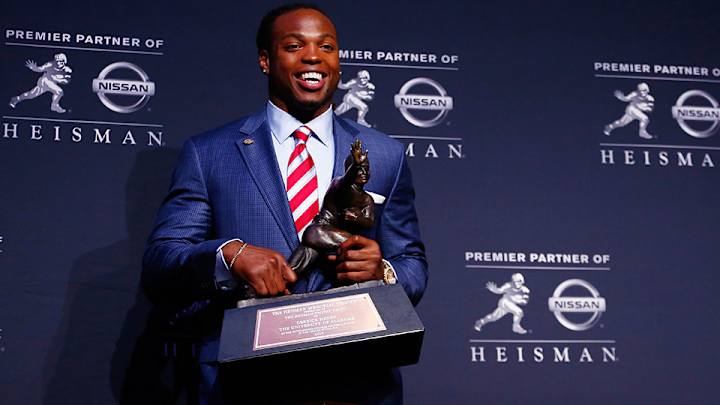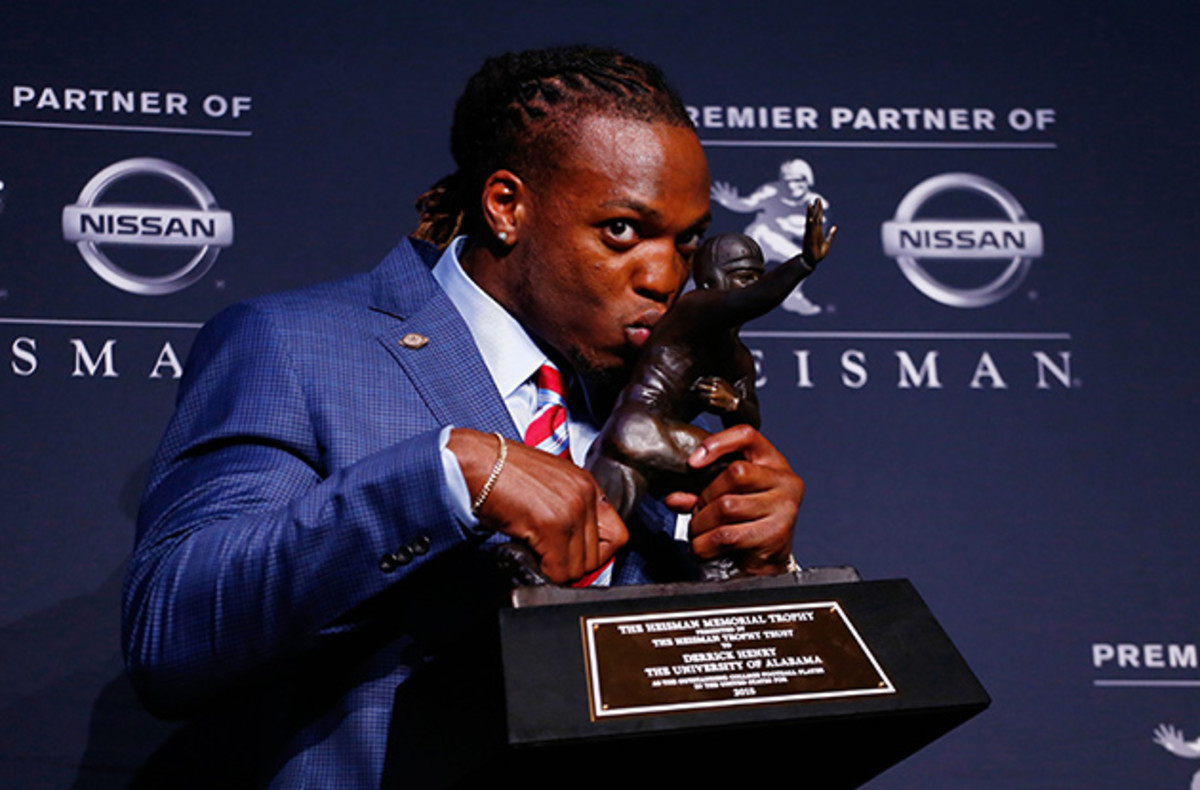Turning the Tide: Derrick Henry wins Heisman as RB drought comes to end

NEW YORK — Derrick Henry knows a thing or two about carrying footballs, but bronze trophies are a little different. On Saturday night Henry, Alabama’s junior running back, stepped to the front of a packed ballroom on the sixth floor of the New York Marriott Marquis. Fifteen minutes earlier, he’d become the 81st winner of the Heisman Trophy. Now the famous stiff-arming statue rested comfortably in Henry’s grip, a hefty Christmas present delivered a couple of weeks early.
Henry placed the trophy on a nearby podium as a man in the crowd posed a question: Is the Heisman pretty heavy? “Yeah,” Henry said, “but when you win something like this, it doesn’t seem to matter.”
All 70 pounds of that football history wasn’t likely to leave Henry’s hands anytime soon. The running back became on Saturday just the second Alabama player ever to win a Heisman, joining fellow running back Mark Ingram, who took home the trophy in 2009. Henry earned 1,832 total points, narrowly beating out Stanford running back Christian McCaffrey (1,539) and Clemson quarterback Deshaun Watson (1,165) for college football’s top prize. The Alabama star won five of six voting regions; McCaffrey claimed the Far West.
Alabama’s Derrick Henry wins 2015 Heisman Trophy
Henry’s victory serves as an outlier in a Heisman era largely defined by quarterbacks. Prior to Saturday, only one non-quarterback—Ingram—had won the award since 2000. The Heisman Trust no longer recognizes Reggie Bush’s winning season at USC in 2005. Fourteen different quarterbacks had won in the last 15 seasons, and dual-threat signal-callers made up five of the last seven winning passers.
But with Henry and McCaffrey finishing first and second in 2015, running backs finished 1-2 in the Heisman voting for just the second time since 1994. Henry, in particular, proved the running back is still alive in the Heisman race. “I never thought I’d be up here,” Henry said. “But God is good.”
• Derrick Henry, Christian McCaffrey lead SI.com’s 2015 All-America team
While a handful of rushers had threatened in recent Heisman races—Wisconsin’s Melvin Gordon (2014), Alabama’s Trent Richardson (2011) and Oregon’s LaMichael James (2010) all finished in the top three of voting—it took a record-breaking season by Henry to bring a trophy back to the running backs. Henry was a workhorse for the Tide, carrying the ball 339 times for 1,986 yards and 23 touchdowns for the eventual SEC champions. Henry’s rushing total set an SEC record, breaking a mark set by former Georgia running back (and Heisman winner) Herschel Walker (1,891 yards) in 1981—except Henry did it on 54 fewer carries.
Instant Analysis: Henry shines in Alabama's Iron Bowl win over Auburn
The burly junior bested another record set by a Heisman winner in a 29–13 victory at Auburn on Nov. 28. His 271 rushing yards against the Tigers broke Bo Jackson’s Iron Bowl single-game rushing mark (256). To Henry, Jackson and Walker had long represented college football royalty. Now Alabama’s star found himself following in their footsteps. “I’m not where they are right now,” Henry said, “but it’s an honor to be mentioned with their names.”
Underclassmen made up five of the last eight Heisman winners, but the junior Henry was forced to wait his turn to reach New York. For two seasons Henry backed up starting rusher T.J. Yeldon at Alabama, biding his time in Tuscaloosa. The process often left the regularly humbled Henry frustrated. He’d set a national high school record in career rushing yards (12,124) as a five-star prospect at Yulee (Fla.) High. During one meeting in his freshman season at Alabama, Henry admitted to coach Nick Saban that he’d thrived at Yulee largely on talent alone. The SEC, Henry found, took a different level of effort.
But on Saturday Saban said Henry’s intense work ethic paid off in 2015. This season Henry rushed more times than any FBS player; in Alabama’s last two games, he recorded a whopping 90 carries. But that was mostly by design: Saban routinely used Henry to wear down opposing defenses, particularly in clock-management situations. Plus, the 6'3", 240-pound Henry can handle the beating. Asked on Saturday if he’s ever coached a more durable player, Saban said, “I can’t really say that I have.”

Henry’s Heisman victory capped a season that had been largely dominated by running backs. LSU’s Leonard Fournette served as the de-facto Heisman frontrunner until he limped to 31 yards on 19 carries in a 19–14 loss at Alabama on Nov. 7. But that game consequently launched Henry’s Heisman campaign. He reeled off 210 yards and three touchdowns on 38 carries. After that, rushers like Florida State’s Dalvin Cook and Ohio State’s Ezekiel Elliott lingered in the Heisman discussion, while quarterbacks across the country failed to gain enough notoriety.
Why Alabama's Derrick Henry should win the Heisman Trophy
But Henry came through when it counted for Alabama, which paid off for Heisman voters. He helped sink LSU when it was ranked No. 2 in the country, and he ran all over Auburn and Florida in deciding games late in the season. This weekend, as Henry spent two days in the New York spotlight, he deferred most personal praise to his locker room back in Tuscaloosa. “Whenever I get a question about anything,” Henry said, “I’m always going to mention my teammates and coaches.”
Added Saban: “I don’t see how anybody could represent the university, our team and our program in any more of a first-class way than Derrick Henry has.”
The journey isn’t over for Henry and the Crimson Tide, who have a date with Michigan State later this month in a playoff semifinal in the Cotton Bowl. But on Saturday, in an expansive theater nestled in the middle of Times Square, Henry captured a seminal moment for running backs everywhere. Cook, Fournette and McCaffrey, who all finished in the top 10 of Heisman voting, are set to return in 2016. Plenty of quarterback talent comes back as well—including Watson—but Henry showed running backs can still flourish in the modern Heisman race.
• STAPLES: Henry hits like freight train but brings even more to Alabama
As Henry smiled under the hot lights on Saturday, he struggled to describe the moment before him. The best player in college football was once just a small-town kid in north Florida who idolized the greats of the sport; he studied the games of Earl Campbell, Walter Payton and Adrian Peterson. Now Henry found himself holding a 70-pound piece of bronze, a symbol that would forever define his career.
Henry paused. Instead of reflecting on one of the best moments of his college football career, he offered a piece of advice. “If you have a dream, chase it,” Henry said. “If you believe it, you can achieve it.”
